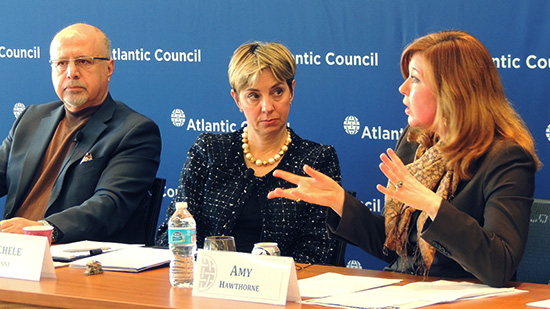 Since the July 3 ouster of former President Mohamed Morsi, many have questioned whether efforts to transition to democracy in Egypt are working and whether democracy promotion should be part of US policy towards Egypt. On January 23, 2014, the Rafik Hariri Center for the Middle East hosted Shibley Telhami, Anwar Sadat Professor for Peace and Development at the University of Maryland, College Park, in an event moderated by Michele Dunne, Senior Associate at the Carnegie Endowment for International Peace, to release Senior Fellow Amy Hawthorne’s issue brief entitled: “Getting Democracy Promotion Right in Egypt.”
Since the July 3 ouster of former President Mohamed Morsi, many have questioned whether efforts to transition to democracy in Egypt are working and whether democracy promotion should be part of US policy towards Egypt. On January 23, 2014, the Rafik Hariri Center for the Middle East hosted Shibley Telhami, Anwar Sadat Professor for Peace and Development at the University of Maryland, College Park, in an event moderated by Michele Dunne, Senior Associate at the Carnegie Endowment for International Peace, to release Senior Fellow Amy Hawthorne’s issue brief entitled: “Getting Democracy Promotion Right in Egypt.”
Hawthorne outlined some of the main arguments in her Issue Brief which center around the contention that it is in the United States’ long-term strategic interest to promote democracy in Egypt. She noted that Egypt is a case study of how the United States struggles to balance competing security and reform interests. Despite these seemingly competing interests, US policy should not take an either-or approach, she argued. Instead, she contended that US policy should take into consideration the notion that democracy promotion is important for strategic, long-term reasons. As she put it, a democratic Egypt will help ensure stability in the country and the development of US-Egypt ties that are not solely transactional.
Hawthorne went on to note that although US leverage in Egypt has diminished since 2011 due to anti-American sentiment and US government missteps, there are still opportunities for potential leverage. Some in the Egyptian government want a strong military-to-military relationship, economic cooperation, and international legitimization of the political system. Indeed, the interim government has gone to great lengths in order to garner international approval for the transition. Given this dynamic, Hawthorne argued, US officials should not offer false praise to the Egyptian government when violations and repression occur. Just because the United States has strategic interests in Egypt, it should not ignore human rights abuses, she said. Instead, she argued, the United States needs to maintain consistent rhetoric on democracy promotion by critiquing the Egyptian government for these abuses. Hawthorne likewise argued for a reevaluation of military aid, saying that although military aid serves US strategic interests, certain aspects of that aid need to be restructured.
Hawthorne closed with a discussion of another type of potential influence–linkage, which refers to American soft power and creating connections between institutions in American society and their Egyptian counterparts. In this regard, the US government is limited in what it can do, but it can remove the structural obstacles that make people-to-people relationships harder to build by promoting more options for higher education access and private sector cooperation, she argued. She went on to elaborate that these initiatives should target Egyptian youth since they already embrace the democratic ideals that the United States wants to promote.
Telhami responded to Hawthorne’s argument and pointed out that even if democracy promotion is a strategic or moral interest for the United States, it is still an interest that must be placed within the context of other strategic priorities. Currently, he noted, the United States is focused on different priorities; some by choice and others by necessity. These priorities do not include democracy promotion in Egypt because democratic failure in Egypt will not create a war. On the other hand, failure to succeed in negotiations in Iran might lead to military action; thus, US officials rank this as a higher priority than democracy promotion in Egypt.
